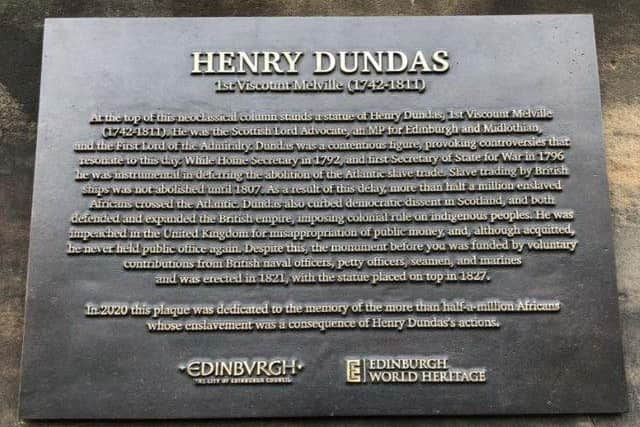Fresh plea to public for views on how Edinburgh should address its links with slavery
and live on Freeview channel 276
Let us know what you think and join the conversation at the bottom of this article.
Many streets, buildings and monuments in the Capital are named after figures who were engaged in, supported and profited from slavery or the slave trade.
Now the council is asking how the city can “publicly acknowledge and actively atone for its part in supporting and benefiting from Atlantic slavery and colonial expansion”.


Advertisement
Hide AdAdvertisement
Hide AdThe Edinburgh Slavery and Colonialism Legacy Review Group, chaired by Sir Geoff Palmer, was established to look at the issue and come up with recommendations.
A consultation, inviting people to complete an online questionnaire, was launched in October and closes on January 19.
The council has tweeted a reminder, encouraging people to give their views.
The questions include whether monuments should be removed and streets and buildings renamed; features should be kept but with information provided to give a more “rounded interpretation”; or whether no features should be removed.
Advertisement
Hide AdAdvertisement
Hide AdThe questionnaire also asks about a civic apology; city-wide observance of the annual International Day for the Remembrance of the Slave Trade and its Abolition; and dedicated friendship agreements with countries most impacted by Edinburgh’s historic involvement with slavery and colonialism.
Other ideas floated in the consultation include a research or study programme on Edinburgh’s links with slavery and colonialism; education about black history and culture; a toolkit to help communities address the legacies of slavery and colonialism in their neighbourhoods; a contemporary artwork memorialising the city’s historic links with the slave trade and the Caribbean; and a commemoration programme to celebrate individuals from under-represented groups who have contributed significantly to Edinburgh life.
When the consultation was launched Sir Geoff said: "I want to hear the voice of the people on all the complexities of the city's history. I think people might not be aware of some of the links in the city and will be interested in learning about it.
"We cannot change the past but we can change consequences of the past, such as racism, for the better, using greater public awareness.”
Advertisement
Hide AdAdvertisement
Hide AdA permanent new plaque has already been installed on the Melville monument in St Andrew Square, denouncing Henry Dundas' role in deferring the abolition of the Atlantic slave trade and expanding the British Empire.
A message from the Editor:
Thank you for reading this article. We're more reliant on your support than ever as the shift in consumer habits brought about by coronavirus impacts our advertisers.
If you haven't already, please consider supporting our trusted, fact-checked journalism by taking out a digital subscription.
Comment Guidelines
National World encourages reader discussion on our stories. User feedback, insights and back-and-forth exchanges add a rich layer of context to reporting. Please review our Community Guidelines before commenting.
